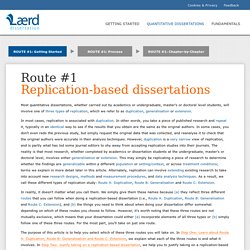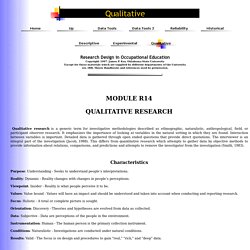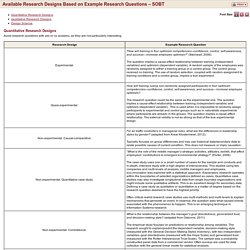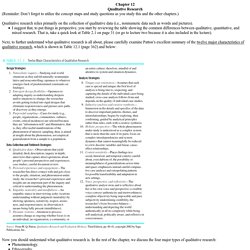

Hope you find value.
Craig Barton, Ph.D.
Saldana 2009 the coding manual for qualitative researchers. FINDING THEORY-METHOD FIT: A COMPARISON OF THREE QUALITATIVE APPROACHES TO THEORY BUILDING. Qualitative methods resource Jowsey Desborough 12.08.16 final2 (2)
Research, Style, Methodology: A Selected Bibliography. These books are all available in the Prescott College Library; check for additional materials in your local libraries (last updated 11/20/2014) Style Manuals & Writing Guides Research & Methodology Surveys & Interviews Library 0f Congress Subject Headings Style Manuals & Writing Guides American Psychological Association. (2010).

Publication manual of the American Psychological Association. Washington DC: APA. REFERENCE AC1.P83 2010 Associated Press. (2009). Cone, J.D. & Foster, S.L. (2006). Corrigan, T. (2001). Council of Science Editors. (2006). Faigley, L. (2006). Fowler, H.R. & Aaron, J.E. (2010). Galvin, J.L. (2009). Gilpin, A.A. (2000). Gustavii, B. (2003). Hacker, D. & Sommers, N. (2011). Knisely, K. (2005). Lindsay, D. (2011). Machi, L.A., & McEvoy, B.T. (2009).
Getting started with replication-based dissertations. Replication-based dissertations Most quantitative dissertations, whether carried out by academics or undergraduate, master's or doctoral level students, will involve one of three types of replication, which we refer to as duplication, generalisation or extension.

In most cases, replication is associated with duplication. In other words, you take a piece of published research and repeat it, typically in an identical way to see if the results that you obtain are the same as the original authors. In some cases, you don't even redo the previous study, but simply request the original data that was collected, and reanalyse it to check that the original authors were accurate in their analysis techniques. However, duplication is a very narrow view of replication, and is partly what has led some journal editors to shy away from accepting replication studies into their journals.
Are You a Bricoleur?, Bricolage and the DIY Paradigm. Open-Ended Questions for Qualitative Inquiry. 1. Understanding 21st Century Qualitative Research. What is Reflective/Reflexive Mindset for Research Inquiry? Advanced Qualitative Analysis - Course. Home - QualitativeMind. Understanding Theoretical Framework - Dissertation. The placebo effect and a partici. The placebo effect and a participatory worldview John Heron, formerly Assistant Director, British Postgraduate Medical Federation, University of London Published in D.Peters (ed), Understanding the Placebo Effect in Complementary Medicine, London, Churchill Livingstone, 2001, pp 189-212.

Outline Inquiry paradigms Cartesian anomaly The downfall of positivism A participatory worldview Critical subjectivity and four ways of knowing Methodology: co-operative inquiry The body as a subjective-objective reality The relevance and limits of conventional medical research The relevance of co-operative inquiry A co-operative inquiry project Inquiry paradigms Any method of inquiry presupposes an inquiry paradigm, which is a set of basic beliefs about the nature of reality and how it may be known (Guba and Lincoln, 1994; Heron and Reason, 1997). These are philosophical presuppositions of the method and are not derived from the method.
Qualitative. Qualitative research is a generic term for investigative methodologies described as ethnographic, naturalistic, anthropological, field, or participant observer research.

It emphasizes the importance of looking at variables in the natural setting in which they are found. Interaction between variables is important. Detailed data is gathered through open ended questions that provide direct quotations. QUALITATIVE%20METHOD%20SAGE%20ENCY. Qualitative program evaluation methods. J.

Mitch Vaterlaus, M.S. Graduate Extension Assistant Utah State University Brian J. Higginbotham, Ph.D. Associate Professor and Family Life Extension Specialist Utah State University. Role of Theory in Qualitative Research. Bracketing (Epoche): SAGE Dictionary of Qualitative Inquiry - IIER 16: Mackenzie and Knipe - research dilemmas: Paradigms, methods and methodology. Available Research Designs Based on Example Research Questions – SOBT. Quantitative Research Designs Avoid research questions with yes or no answers, as they are not particularly interesting.

Qualitative Research Designs Design Science References Adeyemo, O. Independent Study. DissertationGuidesWorkbook T3. Hughes Researching eprint. Generic Qualitative Research in Psychology. Qualitative vs. Quantitative: Conflict or Partners? COMPASSS: About. » About What is COMPASSS?

COMPASSS (COMPArative Methods for Systematic cross-caSe analySis) is a worldwide network bringing together scholars and practitioners who share a common interest in theoretical, methodological and practical advancements in a systematic comparative case approach to research which stresses the use of a configurational logic, the existence of multiple causality and the importance of a careful construction of research populations. It was launched in 2003, and its management was re-organized in 2008 and 2012 to better accommodate the growing needs in the field. Its main goal is to further develop systematic comparative case analysis as a genuine and established research strategy to study many different and diverse phenomena.
Fundamentals of Qualitative Research Methods: Developing a Qualitative Research Question (Module 2) Qualitative Methodology. Assumptions of Qualitative Designs. Core Concepts § Q: Foundations of Qualitative Research in Education. Professor Graham Gibbs - Qualitative Research. Qualitative research designs?preview=Patton 10 tips for doc students and types of qual designs. Resaerchers Speak - Videos: Foundations of Qualitative Research. Chapter 12. Chapter 12 Qualitative Research (Reminder: Don’t forget to utilize the concept maps and study questions as you study this and the other chapters.)

Qualitative research relies primarily on the collection of qualitative data (i.e., nonnumeric data such as words and pictures). I suggest that, to put things in perspective, you start by reviewing the table showing the common differences between qualitative, quantitative, and mixed research. That is, take a quick look at Table 2.1 on page 31 (or go to lecture two because it is also included in the lecture). Subjectivity and Objectivity in Qualitative Methodology. The PDF file you selected should load here if your Web browser has a PDF reader plug-in installed (for example, a recent version of Adobe Acrobat Reader).

If you would like more information about how to print, save, and work with PDFs, Highwire Press provides a helpful Frequently Asked Questions about PDFs. Alternatively, you can download the PDF file directly to your computer, from where it can be opened using a PDF reader. To download the PDF, click the Download link above. Fullscreen Fullscreen Off Copyright (c) 2002 Carl Ratner This work is licensed under a Creative Commons Attribution 4.0 International License.
Researchware - Qualitative Research Software for the Analysis of Qualitative Data. Google Ngram Viewer. Editor Software Technical and Corporate Support. What writing style does StyleWriter recommend?

Will StyleWriter cure all my writing faults? Who will benefit from using StyleWriter? What is the business case for StyleWriter? What programs does StyleWriter work with? Can you explain the technical information and system requirements for StyleWriter 4? Does StyleWriter work on a Mac? Are there different language versions of StyleWriter? Can I install StyleWriter on more than one machine? Stepping into software: Student Guide. Stepping into software In this section, I've provided a fairly straightforward pathway into software use via a set of suggested steps, with a bundle of hints about how to 'think first' before you take the next step in software.
Interviewing Participants - Qualitative Inquiry. Triangulation. Doctoral Seminar Qualitative. Data Coding - Qualitative Analysis. Saturation of Themes, Data, Sources. Lessons Learned: Preparing a qualitative dissertation. Designing: Foundations of Qualitative Research. Designing & Proposing Qualitative Research We start our sections on conducting qualitative research with designing and proposing. These intertwined processes serve as spaces for you as a researcher, along with your colleagues and committees, to plan thoughtfully while considering the major challenges and issues that come along with conducting qualitative research.
Some amount of designing must take place before any data is collected – at the very least a researcher should know where they are researching and some general areas of interest. They should have some background in general theories that guide their research and some of the current research in their field, if any exists. And most research must be passed by an Institutional Review Board before any data is collected. Research Questions offers tips and resources for honing your topic of inquiry. Research Proposals discusses how to write a research proposal, with resources on the major proposals for doctoral students at HGSE. 13887_Chapter5.pdf. Lectures. It's (Beyond) Time to Drop the Terms Causal-Comparative and Correlational Research. It's (Beyond) Time to Drop the Terms Causal-Comparative and Correlational Research in Education Burke Johnson University of South Alabama Instructional Design & Development Program Abstract.
Qualitative Research Guidelines Project. Analysis-of-Qualitative-DataXY. Basics of Qualitative Research: Techniques and Procedures for Developing Grounded Theory: 9781412997461: Reference Books @ Amazon.com. Onwuegbuzie1.pdf. Methods in social research. Social Research Methods and Program Evaluation Resources Basic guides These have very plain and clear descriptions of what evaluation is. Useful to introduce people to evaluation. Qualitative research. In the conventional view, qualitative methods produce information only on the particular cases studied, and any more general conclusions are only propositions (informed assertions).
Quantitative methods can then be used to seek empirical support for such research hypotheses. W.K. Kellogg Foundation Evaluation Handbook.
Guide 7: Less Structured Designs. A refresher from our overview: To start (my opinion), I don't like the terminology distinction "quantitative-qualitative. " It confuses the level of the variables (such as nominal or interval) with the way you conducted your study (e.g., experiment, ethnography), and that is just plain inaccurate. Action Research. Arts-Based Research. Case Study Resources. Content Analysis. Critical Social Research. Delphi: Approach, Design, Method, Model, Research, Study, or Technique? Descriptive studies. Discourse Analysis. Ethnographic Research. Ethnomethodology. Evaluation Research. Exploratory Research. Grounded Theory Research Design. Hermeneutics Research Methodology. Historical Research.
Narrative Analysis. Narrative and Performing Arts (NAPAR) Research. Phenomenological Design. Portraiture Research. Semiotics Research Design. Thematic Analysis.